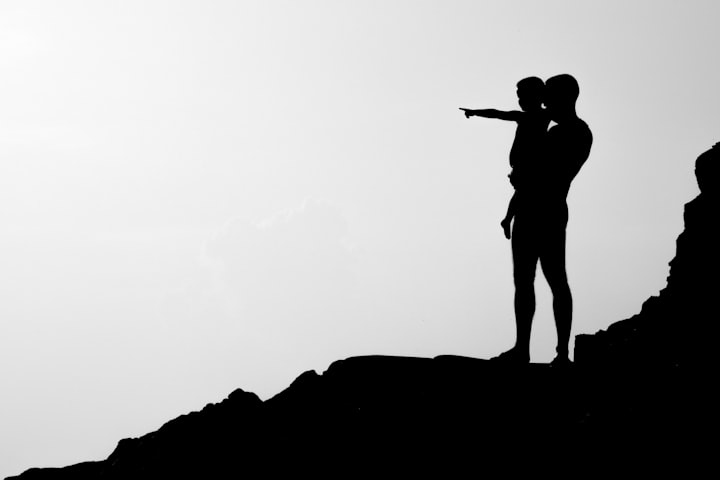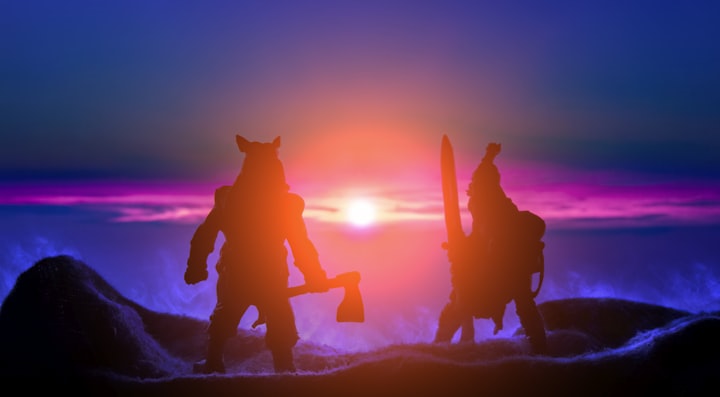My Human Father
A real man leaves on a real legacy

I never got on with my dad. The soundbite reason for this is that he was a violent alcoholic. There is the story, all wrapped up in a self-explanatory bow, a tabloid headline, a sensationalist piece of gossip.
But of course, that isn't real life, that isn't the full story. The full story is far more mired in addiction, trauma, blame, and the unbearable responsibility of being.
Fathers. Sons. It's an inescapable bond, an indelible mark handed down from one generation to another.
I've written many times over the years about my father and his addiction, his behaviour, and the therapy I underwent to extract myself from my past. I could only write about those things now, trauma-free and detached.
But please understand he was a good man. When sober. And what he handed down to me wasn't all bad. He lives within me, still. Oddly, this is a thought I had just yesterday, 7 years after his death, as I was padlocking the shed. The most profound of thoughts always visit us during the most mundane moments.
I carry him within me, he's still alive in my mind. I still reach to the phone to call him. A Beatles documentary appears on TV, I go to call him. My car needs fixing, I go to call him. A big news event happens, I go to call him. Despite all the hatred, and sympathy, I have felt for him and his predicament with alcohol over the years, he was still someone I would reach out to, a constant in my life, whether I liked it or not.
I am not like him at all personality-wise, nor do I have his intimidating stature, but I do have his face. And as I get older (I am 45) I look in the mirror and I see him. It's the most bizarre thing, even if I wanted to escape him, I couldn't, as there he is in every selfie, in every candid photo, in every reflection.
But I like that. I feel it's my responsibility to remember him, for if I forget, who else is there? My elderly mother? My sister? Perhaps. But I don't want him to just slip away, as if he didn't exist. He meant something to me, a tormentor and figure of hatred to a degree, but also a loyal protector and a security blanket. His dichotomy of character was him. The loving and gentle sober father and the raging, violent drunk. Dr Jeckel and Mr Hyde were still the same person.
How can you extract one part of a person's personality from another? You can't, is my conclusion. You take them at face value, for who they are, wholly, or you lie and remember a fantasy. If you love them, if that's your commitment, then you love them.
I never doubted he loved me.
For all the violence, for all the drunken escapades and upset, I never felt unloved. Perhaps this is why I grappled so much with my relationship with him in many ways; he both gave and took, he both scolded and soothed, he both loved and he raged. And when he was "bad", when he was drunken and violent, there was always a part of him that you could tell was hurting, that was letting himself down, that alcohol had a grip on him, a grip that eventually took him to the grave. No one chooses to be an addict, no one wants to die from addiction. He was a victim as much as a perpetrator, so why separate his bad side from his good? They are all him. And, because of that, they are all me.
He would write me and my sister stories and poems, draw us pictures, and make us comicbooks. He would create giant sand sculptures on the beach that drew in curious crowds when we were on holiday, and he would decorate the house and fix the cars with dexterous thick hands that all dads seem to have. When he got older, and sober, he began playing guitar and wrote mellifluous songs with aplomb. He was a sensitive and talented man.
But he was haunted by the trauma of his childhood and self-medicated the only way working-class men from Glasgow did; he drank. I can't blame him, and yet I can. I can't hate him, and yet I do. I can't love him, and yet I do also.
Most importantly, I now understand him.
Isn't it ironic that when we get to an age where we can relate to our fathers, they are almost always gone? Perhaps this is the rite of passage, the burden is of the son's to carry and use, to grow and mature.
He wasn't a great father, all being equal, but trauma and addiction does that to a man. Underneath it all, he was good and just, a man churned up by a tumultuous life and a gnawing addiction. I often think if he was born today, he'd grow up in a world that's deeply in tune with mental health and trauma, and perhaps he would have been saved from his boozy fate. But back then, in the factories and pubs of 1960s Britain, you shut up and got on with it. And no one can deny he got on with it. He did his best. He had no help.
My father mostly taught me what not to do, how not to act, how not to live. But in there, in the mess and the drama, there were good times, there was love. He loved me the very best he could. It has taken me years, maybe decades to understand that, but he was trying. He tried. Can you judge a man by his flaws, when we all have so many of our own?
Real love is gritty and tenacious. Real people are the same. I didn't have a role model as a father, but I had a father, and he was human. He doesn't need to be remembered as a stereotype or a caricature, he needs to be remembered as him. And I remember him fully. He's still alive within me. I just have to remember I can't phone him.
About the Creator
Jamie Jackson
Between two skies and towards the night.
Enjoyed the story? Support the Creator.
Subscribe for free to receive all their stories in your feed. You could also pledge your support or give them a one-off tip, letting them know you appreciate their work.






Comments
There are no comments for this story
Be the first to respond and start the conversation.